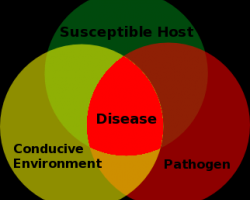Is Addiction A Disease Or A Choice?
 If you want to start an argument in almost any treatment setting, that’s the question to ask. Underlying the answers you get will be a deep question about responsibility. If it’s a choice, well then, addicts bear the entire weight of their poor choice. In fact, it’s probably better to say it’s a character flaw. On the other hand, if it’s a disease then the addict seems to escape all the responsibility – after all, we don’t blame people with in infection for having a bacterial “problem,” do we?
If you want to start an argument in almost any treatment setting, that’s the question to ask. Underlying the answers you get will be a deep question about responsibility. If it’s a choice, well then, addicts bear the entire weight of their poor choice. In fact, it’s probably better to say it’s a character flaw. On the other hand, if it’s a disease then the addict seems to escape all the responsibility – after all, we don’t blame people with in infection for having a bacterial “problem,” do we?
How about we dodge the false implication that it has to be one or the other? There are other examples, after all. Diseases that are augmented by behavioral choices. Diabetes is one such. It is clear that someone who gets type 2 diabetes has both a propensity for the disease and that their lifestyle (especially diet and exercise) contribute to how bad the disease becomes. In fact, there are cases where no diabetes would occur as long as the person kept their weight under control. No one argues that diabetes isn’t a “real” disease.
There are many others. The pairing is between a genetic propensity and behavior. We know that some people are more prone to addiction. We also know that their choices matter. As long as these terms are kept in perspective, addiction is both a disease and a choice. There is no choice about whether or not someone is prone to addiction, but there is a choice about how they behave.
Interestingly, the choices become more constricted due to the disease. Someone who is actively building their disease will be less likely to feel they have any choices left at all. Part of the treatment is then to give them the opportunity to do something different. But learning to live with the disease and keep it at bay by making the right decisions isn’t easy. Partly it’s because of how many addictive substances rewire the brain as part of the disease. Partly it’s because of a lack of real opportunity to change. In some ways, addiction is as much of a societal disease as a genetic one.
Current estimates put the genetic component of addiction at anywhere from 20% to as high as 40%, depending on the drug and the study. Research continues and almost every year another “addiction gene” makes the news. The added factors are family history and economic status (among others). It is unlikely that we will ever be able to do a DNA test to find out ahead of time whether someone will become an addict. Even if there is a genetic “push,” choices do matter.